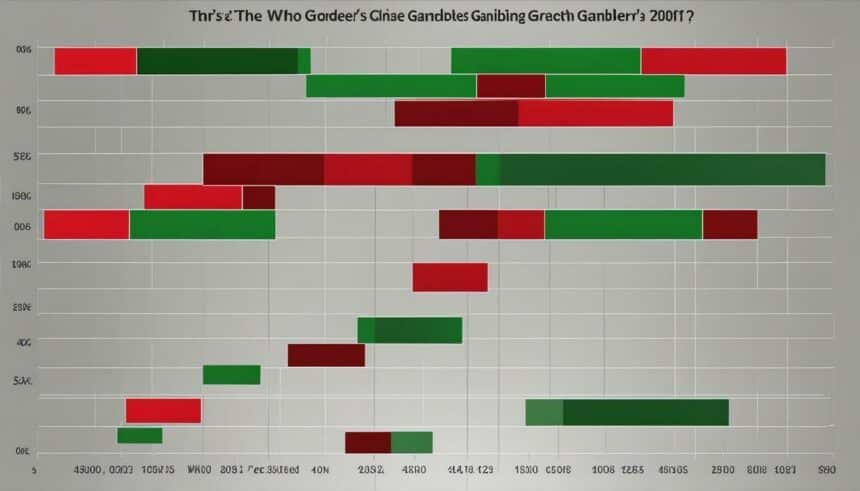For many people, gambling is an exciting form of entertainment that offers the possibility of winning big. However, before diving into the world of gambling, it is important to understand the reality of winning percentages and odds.
In this section, nerf-game.com will explore the concept of gambling winning percentages and delve into the question of what percentage of gamblers actually win. We will discuss the odds of winning in gambling and provide insights into the factors that can influence the outcomes for individual gamblers.
Key Takeaways:
- Understanding the percentage of gamblers who win can provide valuable insights into the world of gambling.
- The odds of winning in gambling can vary depending on various factors, such as the game being played, the strategy used, and luck.
- Responsible gambling practices and a realistic approach can help mitigate risks and increase enjoyment in this popular form of entertainment.
Understanding the Winning Rate in Gambling
Gambling is a popular form of entertainment that has the potential to offer exciting rewards to players who win. As such, many individuals try their luck at different gambling activities with the hope of winning. But, what are the chances of winning in gambling?
The winning rate in gambling can be defined as the percentage of players who win at a particular game or over a specific period. The winning percentage of casino gamblers, for instance, varies depending on the game and other factors.
It is essential to note that every gambling activity has different chances of winning. Some games have higher winning rates than others, while some have much lower ones. For example, games such as slot machines have a lower winning percentage compared to games like blackjack or poker.
| Gambling Game | Winning Percentage |
|---|---|
| Blackjack | 49% |
| Roulette | 47% |
| Poker | 42% |
| Slot Machines | 20% |
As seen from the table above, the winning percentage varies greatly across different gambling games. Therefore, it is crucial to understand the chances of winning in the game you choose to play.
The odds of winning in gambling can be influenced by various factors such as the player’s strategy, skills, and experience. Players who know the game’s rules and employ effective strategies have a higher chance of winning.
However, luck and risk management also play a critical role in determining the outcome of gambling activities. It is crucial to understand the risks and manage them responsibly to increase enjoyment and minimize potential losses.
In conclusion, understanding the winning rate in gambling, including the winning percentage of casino gamblers, can offer valuable insights into the world of gambling. While the chances of winning may vary depending on various factors, a realistic approach and responsible gambling practices can help mitigate risks and enhance the entertainment value of gambling activities.
Success Rate of Gamblers and Casino Games
When it comes to gambling, success rates can vary greatly depending on various factors. While some games, such as slots, offer lower chances of winning, others, like blackjack, can be more favorable to gamblers.
According to research, the overall rate of winning in casino games is approximately 30 percent, which means that 70 percent of the time, players end up losing. This may seem discouraging, but it’s important to keep in mind that these percentages are based on long-term averages and may not necessarily reflect individual outcomes.
When examining the success rates of different casino games, it’s clear that certain factors can influence the odds of winning. For example, games like poker and blackjack require a combination of skill, strategy, and luck, while others, like slots, are purely luck-based. This means that players who take the time to learn and master these games may have a higher success rate than those who rely solely on chance.
| Game | Success Rate |
|---|---|
| Blackjack | 49% |
| Poker | 42% |
| Roulette | 42% |
| Slots | 30% |
Another factor that can impact success rates in gambling is the house edge. This refers to the mathematical advantage that the casino has over the player, which can vary depending on the game and the specific rules in place. For example, in blackjack, the house edge is typically around 0.5%, while in slots, it can range from 2% to over 10%, making it more difficult for players to come out on top.
Overall, while the success rate of gamblers in casino games may not be particularly high, there are still ways for players to increase their chances of winning. By understanding the nuances of different games and practicing responsible gambling, players can enjoy this popular pastime while minimizing their risks.
Factors Affecting Gambling Results
Gambling outcomes can be influenced by various factors, including strategies, skills, luck, and risk management. Let’s take a closer look at each of these factors to see how they impact the results of gambling activities.
Strategies and Skills
Some gambling games require specific strategies and skills to increase the chances of winning. For example, in card games like blackjack and poker, players can use counting techniques and bluffing maneuvers to outsmart their opponents and improve their odds of winning. Similarly, in sports betting, a deep knowledge of the teams and players involved can help bettors make informed decisions and increase their chances of winning.
Luck
Of course, luck plays a significant role in the outcomes of many gambling activities. While some games, such as slot machines and roulette, are purely based on chance, others require some degree of luck to achieve success. For example, in a game of craps, a roll of the dice can mean the difference between winning and losing, regardless of the player’s strategy or skill level.
Risk Management
Another critical factor affecting gambling results is risk management. Players who practice responsible gambling tend to fare better in the long run, as they are less likely to take unnecessary risks and lose large sums of money. Setting limits on the amount of money and time spent on gambling activities, as well as knowing when to walk away from a game, can help mitigate risk and ensure a more enjoyable gambling experience.
Overall Impact of Factors
While the impact of each of these factors may vary from game to game and from player to player, they all play a role in determining the outcomes of gambling activities. By understanding these factors and how they can influence results, players can make better decisions and increase their chances of success.
The Truth About Winning in Gambling
When it comes to gambling, many people wonder how many gamblers actually win in the long run. The truth is that the percentage of gamblers who win varies depending on several factors, including the type of game, the player’s skill level, and luck.
In general, it is difficult to determine an exact winning percentage for gamblers. However, studies have shown that the majority of gamblers end up losing more money than they win over time. This is known as the “house edge,” which refers to the advantage that casinos and other gambling establishments have over players.
While some gamblers are able to win big, it is important to remember that gambling is a form of entertainment and should always be approached with caution. Responsible gambling practices can help mitigate risks and ensure that players are able to enjoy the experience without putting their financial well-being at risk.
Moreover, it is important to avoid chasing losses and to set realistic expectations when it comes to gambling. By understanding the odds of winning and the factors that can influence gambling results, players can make informed decisions and enjoy gambling in a safe and responsible manner.
In conclusion, while winning in gambling is not impossible, it is important to approach the activity with a level-headed mindset and to always prioritize responsible gambling practices. At the end of the day, gambling should be viewed as a form of entertainment and not as a source of income or a way to solve financial problems.
Conclusion
As we have seen, understanding the percentage of gamblers who win can provide valuable insights into the world of gambling. While the odds of winning may vary depending on various factors, responsible gambling practices and a realistic approach can help mitigate risks and increase enjoyment in this popular form of entertainment.
It’s important to remember that, ultimately, gambling is a game of chance and luck. While some players may experience more success than others, there is no guaranteed way to win every time. By setting realistic expectations and sticking to a budget, players can enjoy the thrill of gambling without risking more than they can afford to lose.
In addition, it’s crucial to keep in mind the importance of responsible gambling practices. This includes setting limits, taking breaks, and seeking help if gambling begins to interfere with daily life. By practicing responsible gambling, players can maintain a healthy relationship with the activity and avoid the potential negative consequences that can come with excessive gambling.
Final Thoughts
While the percentage of gamblers who win may fluctuate depending on various factors, it’s important to approach gambling with a clear understanding of the odds. By understanding the winning rate, success rate, and factors that affect gambling results, players can make informed decisions and increase their chances of success.
In the end, however, gambling should always be viewed as a form of entertainment rather than a guaranteed way to make money. By enjoying the experience responsibly and within one’s means, players can make the most of their gambling experience.
FAQ
Q: What percentage of gamblers actually win?
A: The percentage of gamblers who win varies greatly depending on several factors. While there is no exact figure, it is estimated that only a small percentage of gamblers consistently come out ahead in the long run.
Q: What is the winning rate in gambling?
A: The winning rate in gambling refers to the percentage of gamblers who achieve positive results, whether it be through overall profits or consistent wins. This rate can vary widely depending on the specific type of gambling activity and the skills and strategies employed by individual gamblers.
Q: What are the chances of winning in gambling?
A: The chances of winning in gambling are determined by various factors, including the specific game being played, the rules and odds associated with that game, and the skills and strategies of the gamblers involved. It is important to note that gambling outcomes are also influenced by luck, and no guarantees can be made.
Q: What is the success rate of gamblers in casino games?
A: The success rate of gamblers in casino games can vary widely depending on the specific game being played. Some games, like blackjack, poker, and certain forms of video poker, offer higher chances of success for skilled players who employ optimal strategies. Other games, such as slot machines and roulette, rely mostly on luck and have lower success rates.
Q: What factors can affect gambling results?
A: A variety of factors can influence gambling results, including the skills and strategies employed by the gamblers, the specific game being played, the odds and rules associated with the game, and even luck. Other factors like risk management and emotional control can also have an impact on gambling outcomes.
Q: How many gamblers actually win in the long run?
A: It is important to understand that the majority of gamblers do not consistently win in the long run. While there may be short periods of success, the nature of gambling means that the odds are generally stacked in favor of the house. Responsible gambling practices and realistic expectations are crucial for enjoying gambling as a form of entertainment.








